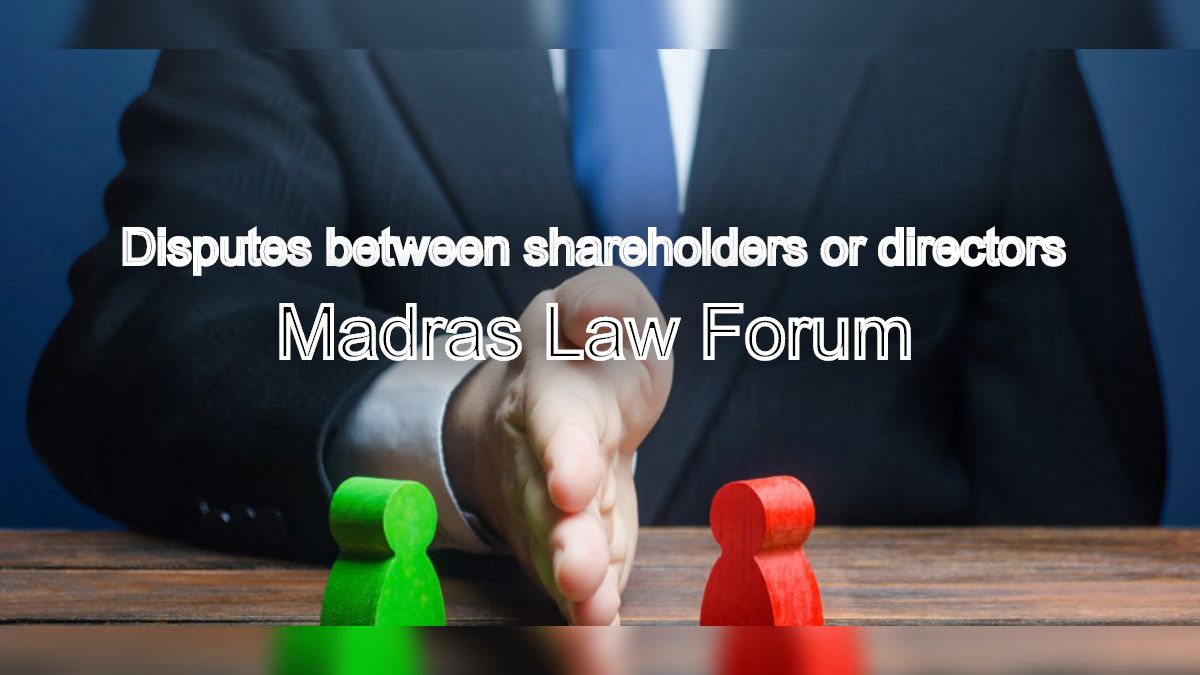How are disputes resolved: Corporate disputes, particularly those involving shareholders and directors, can be complex and contentious. These disputes can arise due to a variety of reasons, including disagreements over management decisions, dividend policies, or the allocation of shares. To resolve these disputes efficiently and effectively, it is crucial to understand the legal framework and the available remedies.
How are Disputes Between Shareholders or Directors Resolved Under Corporate Law: Madras Law Forum
Common Types of Shareholder and Director Disputes
Several common types of disputes can arise between shareholders and directors:
- Shareholder Disputes:
- Disagreements over dividend policies
- Disputes related to share valuation and transfer
- Conflicts over management control
- Oppression of minority shareholders
- Director Disputes:
- Disagreements over board decisions
- Conflicts of interest
- Breach of fiduciary duties
- Removal of directors
Legal Remedies for Shareholder and Director Disputes
Various legal remedies are available to resolve shareholder and director disputes, including:
- Mediation and Arbitration:
- Mediation and arbitration are alternative dispute resolution (ADR) methods that can be used to resolve disputes amicably.
- These methods are often faster and less expensive than litigation.
- Mediation involves a neutral third party who facilitates communication between the parties and helps them reach a mutually agreeable solution.
- Arbitration involves a neutral third party who hears the evidence and arguments of both sides and issues a binding decision.
- Litigation:
- If mediation and arbitration fail to resolve the dispute, litigation may be necessary.
- Litigation can be a time-consuming and expensive process, but it can be effective in resolving complex disputes.
- Common legal actions include:
- Oppression and mismanagement petitions
- Derivative actions
- Winding-up petitions
- Injunctions
- Specific performance
- Regulatory Intervention:
- In certain cases, regulatory authorities like the Securities and Exchange Board of India (SEBI) or the Ministry of Corporate Affairs (MCA) may intervene to resolve disputes.
- These authorities can investigate complaints, issue notices, and impose penalties on erring parties.
Role of Legal Professionals
Legal professionals, such as corporate lawyers, can play a crucial role in resolving shareholder and director disputes. They can:
- Provide Legal Advice: Lawyers can provide guidance on legal rights and obligations, potential remedies, and strategies for resolving disputes.
- Draft Legal Documents: Lawyers can draft legal documents, such as shareholder agreements, partnership agreements, and board resolutions, to mitigate potential disputes.
- Negotiate Settlements: Lawyers can negotiate settlements between the parties to avoid litigation.
- Represent Clients in Court: Lawyers can represent clients in court proceedings, including mediation, arbitration, and litigation.
FAQs: Resolving Shareholder and Director Disputes
Common causes of shareholder and director disputes include:
Disagreements over management decisions
Differences in strategic direction
Conflicts of interest
Disputes over dividend policies
Valuation and transfer of shares
Oppression of minority shareholders
The primary ADR methods for resolving shareholder and director disputes are:
Mediation: A neutral third party facilitates communication and helps the parties reach a mutually agreeable solution.
Arbitration: A neutral third party hears the evidence and arguments of both sides and issues a binding decision.
Litigation may be necessary when:
ADR methods fail to resolve the dispute
The dispute involves complex legal issues
Significant financial stakes are involved
There is a need for a binding court order
A corporate lawyer can:
Provide legal advice and guidance
Draft legal documents
Negotiate settlements
Represent clients in court proceedings
Advise on regulatory compliance
Madras Law Forum offers a range of legal services to help clients resolve shareholder and director disputes, including:
Mediation and arbitration
Litigation
Regulatory compliance advice
Contract drafting and negotiation
Due diligence
Conclusion
Shareholder and director disputes can have significant consequences for companies and their stakeholders. By understanding the legal remedies available and seeking the guidance of experienced legal professionals, companies can effectively resolve these disputes and protect their interests. Madras Law Forum, with its team of experienced corporate lawyers, is well-equipped to handle a wide range of corporate disputes, including those involving shareholders and directors. By proactively addressing potential conflicts and seeking timely legal advice, companies can minimize the impact of disputes on their operations and financial performance.
Read More
- Civil Lawyers in Chennai: How to Choose the Expert Legal Help?
- Filing a Criminal Complaint FIR (First Information Report): Expert Advice
- What is tax law in India? Expert Taxation Lawyers in Chennai
- Can I seek legal remedies or representation for tax disputes and assessments?
- Are there any alternative dispute resolution mechanisms available for civil cases in India? Expert Advice
- National Company Law Appellate Tribunal (NCLAT):
